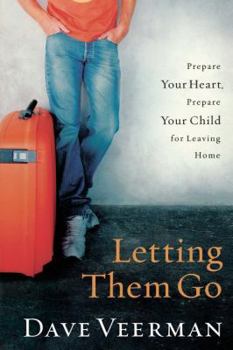Letting Them Go: Prepare Your Heart, Prepare Your Child for Leaving Home
Select Format
Select Condition 
Book Overview
In Letting Them Go, Veerman offers support, help, and understanding from a parent who's been there. He also offers practical advice for the time together before they leave, and a sneak peek at issues that will arise after they've gone.
Format:Paperback
Language:English
ISBN:1591453887
ISBN13:9781591453888
Release Date:February 2006
Publisher:Thomas Nelson
Length:224 Pages
Weight:0.64 lbs.
Dimensions:0.6" x 6.3" x 9.0"
Customer Reviews
3 ratings
Every Parent Should Read
Published by Thriftbooks.com User , 18 years ago
This is an enjoyable read, full of experiential guidance for the time when parents need to let go. When children leave home it is difficult to let go. This book is very helpful in this difficult area of life. I highly recommend this book to all parents.
A solid book with plenty of reassuring advice
Published by Thriftbooks.com User , 18 years ago
With our youngest off to college last September and our oldest newly graduated and living at home looking for a job, it was with great anticipation that I picked up LETTING THEM GO by prolific author Dave Veerman (more than 40 books!). Despite a few flaws, I was not disappointed. This is a solid book, full of practical information for parents trying to strike a difficult balance between loving their "child" and segueing into the adult child/parent relationship. It's most applicable and helpful to Christian parents who have college-bound high school students. Veerman's book utilizes plenty of pull-quotes from other parents and writers, boxed text, and chapter introduction graphics, evincing his expertise as co-founder of The Livingstone Corporation (which does book development and packaging). The resulting short bursts of copy will appeal to parents who want help and good information but don't particularly like to engage with long sections of text. One of the best sections of the book deals with "experimentation" with varieties of Christian worship. Kids who grew up with formal worship may start attending a charismatic church, for example. Or, teens raised in a nondenominational contemporary worship-style church may find comfort in the liturgy at a mainline church. "Often, however, these young people are simply trying to find their own worship style, where they fit and feel connected to God," writes Veerman. "It's part of the process of personalizing faith, making it their own." He also wisely cautions, "While home at break, students may express strong, negative opinions about their spiritual past and the home church... Try not to react emotionally to those charged statements. Consider these tensions as growing pains." As a Presbyterian who has one child joining the Russian Orthodox church and another considering Catholicism, I found his words to be both wise and timely. And what about the kid who expresses doubt about any sort of faith at all? "...our son or daughter is growing up and is honest," writes Veerman, and goes on to help parents with ideas for coping, including reminding them to "rely on God and encourage your student to be an honest seeker in his or her search for the truth." Excellent advice. I found a couple of "wish I'd done this" sections, especially one on preparing siblings for adjustment when they return home for the first time. Good stuff, and I wish I would have prepared my kids better for this life transition. "Making New Assignments" talks about the importance of reassigning chores and the best way to handle the situation. I found this helpful, as kids tend to come back from college breaks and summers feeling as if they no longer have housework responsibilities. I plan to try a few of his ideas this summer. My disappointments in the content were minor. Veerman takes pains to include non-college bound scenarios in his book, but the emphasis is definitely on parenting and letting go of a college-bound high school studen
If your child is leaving home, read this!
Published by Thriftbooks.com User , 18 years ago
When a child leaves home, emotions vary. For some families it is a little frightening and yet exciting. For other families it is a time that they dread and grief can be a significant byproduct. It doesn't matter which camp you fall into, leaving home is a process that can be transitioned into successfully if you follow the ideas Dave Veerman maps out in Letting Them Go. Veerman suggests that parents be prepared (often easier said than done) for the time their children leave. Letting Them Go offers practical techniques as you begin the transition phase of "leaving." He offers the following advice to help the child's transition: -- Make sure your child is spiritually prepared to leave home. -- Always keep the lines of communication open between you and your child. -- Teach your child what they need to know in order to successfully transition into the world, i.e., finance issues, what to do if/when something unexpected happens. And parents must know: -- When to intervene and when to leave things alone. -- How to prepare their hearts and minds for their child's departure. -- How to welcome a child back home if that becomes a reality. Letting Them Go is not just about the preparation for leaving, it is also a practical manual for celebrating a child's last days at home. It also covers the realities of what it will be like the day they leave, after they're gone, sibling issues that will arise, and controlling the worries every parent is bound to have. I specifically found the chapter Looking Down the Road helpful. It's a look at your marriage, the adjustments and the exciting journey you are embarking on as an empty nester (if the last child has left). The Biblical references throughout the book will add to the learning and preparation process. Armchair Interviews says: We all face the time when our children will leave home. How you adjust could be helped by reading Letting Them Go.






